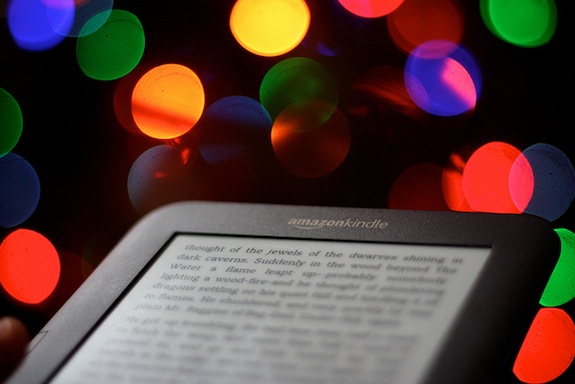E-Readers Don’t Cut Down on Reading Comprehension
Recent research says that reading comprehension on an e-reader and electronic screen is just as good as with paper

Image: thekellyscope
There are a lot of reasons people are resistant to reading online, or using e-readers. They just don’t feel like real books or magazines. There are no glossy pages, no nice book smells. And some have suggested that perhaps we don’t remember what we read quite as well because of it. But recent research says that reading comprehension on an e-reader and electronic screen is just as good as with paper.
Researcher Sara Margolin published a paper in 2010 that found no decrease in reading comprehension when using an electronic screen. Now, in a recent paper, she turned to e-readers.
The idea that e-readers make it harder to remember what you read shows up all over the place. Here is TIME’s Maia Szalavitz, explaining her own trouble remembering the names of characters in books she read with an e-reader:
When I discussed my quirky recall with friends and colleagues, I found out I wasn’t the only one who suffered from “e-book moments.” Online, I discovered that Google’s Larry Page himself had concerns about research showing that on-screen reading is measurably slower than reading on paper.
Margolin tested this idea, showing 90 undergraduates short passages of text. Some of them read the passages on paper, some of them read them with the Kindle, and some of them read them as a pdf on a computer screen. They then had to answer multiple choice questions about what they had read. Here’s Research Digest on the results:
Overall accuracy was at around 75 per cent and, crucially, there was no difference in comprehension performance across the three conditions. This was true whether reading factual or narrative passages of text. “From an educational and classroom perspective, these results are comforting,” the researchers concluded. “While new technologies have sometimes been seen as disruptive, these results indicate that students’ comprehension does not necessarily suffer, regardless of the format from which they read their text.”
Now, this might change depending on how long or confusing the passages are. Szalavitz explains other research that suggests that e-readers might make things harder:
In one study involving psychology students, the medium did seem to matter. “We bombarded poor psychology students with economics that they didn’t know,” she says. Two differences emerged. First, more repetition was required with computer reading to impart the same information. Second, the book readers seemed to digest the material more fully. Garland explains that when you recall something, you either “know” it and it just “comes to you” — without necessarily consciously recalling the context in which you learned it — or you “remember” it by cuing yourself about that context and then arriving at the answer. “Knowing” is better because you can recall the important facts faster and seemingly effortlessly.
At Psychology Today, Mark Changizi argues that the trouble with e-readers, like the Kindle, is that there are very few visual landmarks compared with paper books or magazines, which makes them harder to navigate.
But Margolin’s research suggests that these landmarks aren’t as important as some think. At least for short passages. Margolin wants to continue working to see if her results hold up for longer stories.
More from Smithsonian.com:
The iPad of 1935
In Study, iPads and Readers Help Those With Vision Loss Read Faster
/https://tf-cmsv2-smithsonianmag-media.s3.amazonaws.com/accounts/headshot/Rose-Eveleth-240.jpg)
/https://tf-cmsv2-smithsonianmag-media.s3.amazonaws.com/accounts/headshot/Rose-Eveleth-240.jpg)